Chris Code
United Kingdom

Chris Code is Professorial Research Fellow in Psychology, College of Life and Environmental Sciences, Washington Singer Labs, University of Exeter, England, Foundation Professor of Communication Sciences and Disorders (Hon) at the University of Sydney and used to be Research Manager for Speakability, the British lobbying and advocacy charity for aphasic people conducting research into the psychosocial consequences of aphasia and is Speakability’s National Adviser on Aphasia. He is Patron of AphasiaNow.
Research interests include the neuropsychology of language and speech, psychosocial consequences of aphasia, aphasia and the evolution of language and speech, recovery and treatment of aphasia, the public awareness of aphasia, the history of aphasia, number processing and apraxia.
He is co-founding Editor in Chief of the international journal Aphasiology, past Editor of the International Journal of Language & Communication Disorders and the Australian Journal of Communication Disorders, and is on the editorial boards of a number of scientific journals. His books include Aphasia Therapy (1982 with DJ Müller), Language, Aphasia and the Right Hemisphere (1987), The Characteristics of Aphasia (1991) and Classic Cases in Neuropsychology (Vol I, 1996; Vol II, 2002) (with C-W Wallesch, Y. Joanette & AR Lecour) and Milestones in the History of Aphasia (2008) (with Juergen Tesak).
He has an MA in Phonetics in Linguistics (University of Essex) and PhD in Neuropsychology (University of Wales) is Fellow of the British Psychological Society and Fellow of the Royal College of Speech and Language Therapists. He was the invited presenter of the Annual Mary Law Lecture, 2010. His awards include the 2010 Robin Tavistock Award for Services to Aphasia from The Tavistock Trust.
Is Aphasia a Language Disorder?
I will review contemporary research suggesting that underlying apparent ‘linguistic’ or ‘verbal’ deficits (symptoms of aphasia) are impairments of non-linguistic cognitive mechanisms. Aphasia effects language-specific cognitive operations, but is itself not primarily a disorder of language.
Such functions as STM/working memory, executive functions (eg, attention, (dis)inhibition, anosognosia), praxis (action processing, eg, apraxia of speech), perceptual impairments (agnosia, aspects of anomia) - 'language' is impossible without these supportive cognitive functions and it is these supportive cognitive functions that are impaired, not the rules and representations that are managed by these supportive cognitive preparations.
The traditional centres and pathways model and definition of aphasia is giving way to process and computational accounts of aphasia (McNeil et al., 2015). The traditional model proposes centres in the brain where rules and representations are stored, and they are connected by anatomical pathways (eg, Broca’s – Wernickes areas linked by the arcuate fasciculus).
A growing number of aphasiologists support the idea that the weight of evidence for the processing account is overwhelming and cannot be overlooked. The proposal is that aphasia is a disorder of performance where representations are not ‘lost’. The ‘loss’ of a component of language – phonemes, morphemes, lexical items, syntactic units, is seen as simplistic. The focus is on the processes and mechanisms responsible for the construction of representations, not the building blocks themselves.
I will survey these exciting developments and examine the significant implications for the treatment of aphasia.
Reference: McNeil, M, Hula, W. & Sung, L.E. (2011). The Role of Memory and Attention in Aphasic Language Performance. In Jackie Guendouzi, Filip Loncke and Mandy J. Williams (eds.), The Handbook of Psycholinguistic and Cognitive Processes. (Hove, East Sussex: Psychology Press. Pp.551-577.

